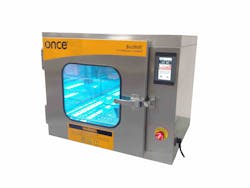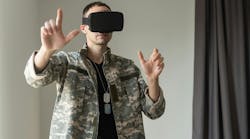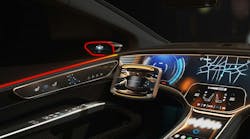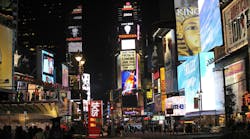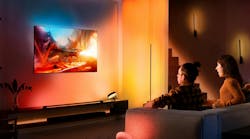With first quarter net income tumbling 39.2% largely as a result of coronavirus, the CEO of Signify said the company is now significantly gearing up development of ultraviolet (UV) disinfection lamps as one of many ways to keep business going amid the pandemic. Signify intends to continue producing the specialty lamps as a key revenue source beyond the crisis.
“We are exploring new opportunities arising from the situation, on one hand through new business opportunities such as the production of UV-C lamps,” CEO Eric Rondolat said in an earnings call with analysts this morning.
UV-C is non-visible light in the 100‒280-nm range. It is a category of ultraviolet that can kill pathogens on surfaces and in air and water, but is also hazardous to human skin and eyes if directly exposed. Just this week, the Illuminating Engineering Society issued guidance on its safe usage, while also encouraging its development.
Rondolat today made it clear that Signify, the world’s largest lighting company, is ramping up its own UV-C development and production. Asked by Societe General analyst Rajesh Singla to compare present and future UV-C lamp production, Rondolat replied, “It’s marginal today, but it can grow multifold.”
Signify, formerly Philips Lighting, makes almost all of its UV-C lamps using low-pressure mercury technology, except for one LED model designed water receptacles and which with its smaller size can fit in appliances such as refrigerators, coffee machines, and humidifiers where mercury lamps would be too large. The products pre-date today’s virus outbreak.
While the company’s current UV-C focus is on selling lamps and drivers to OEMs who build them into disinfection systems and boxes, Signify is also considering making luminaires, a spokesperson told LEDs Magazine.
That would fit into the general notion that CEO Rondolat described of pumping up the UV-C business not only for now, but in the future.
“This will survive after the crisis,” Rondolat told ING analyst Marc Hesselink. “We have a fantastic opportunity to grow that business. We do the light sources, we sell them to OEM customers. And we are at this point in time developing very, very fast, and ramping up on our capacity because we see a demand for those UV lamps all over the world at this point in time.”
While Signify is decidedly cutting costs in other areas, it is now going the other way with UV-C lamp development.
“We are investing money developing our capacity to produce light sources for UV lamps and at the same time also developing a full catalog of fixtures for UV lamps,” Rondolat said. “This is a very interesting opportunity, first of all because it’s totally in line with our strategy and with our purpose, which is also to provide light which is taking care of the health of people on the planet. It’s a very important aspect for us. At the same time, we believe it’s an interesting growth opportunity for now and the future.”
UV-C escalation is just one measure that Signify is taking as it, like all of industry, finds ways to adjust during the world health crisis, which the company today reported took a financial toll. Net income for the quarter ending Mar. 31 fell 39.2% to €27 million ($29.2M) from €44M ($47.5M) in the same quarter a year ago. A 15.3% drop in comparable sales “largely reflects the COVID-19 outbreak,” Rondolat told analysts on the call today.
Overall sales slipped 3.5% to €1.43 billion ($1.54B) from €1.48B ($1.6B), and included sales by Cooper Lighting Solutions and Zhejiang Klite Lighting Holdings Co., Ltd, neither of which Signify owned in the first quarter of 2019.
On a positive note, Signify said it has restored global manufacturing capacity to more than 80%, and Rondolat noted that “we largely restored the performance of our supply chain to minimize the impact on our customers.” He also said that more than 85% of employees have voluntarily reduced their second-quarter workload and pay by 20% in response to a company scheme providing for those reductions. That plan came into effect as executives took a 20% reduction in pay while continuing to work a full schedule.
The company had disclosed several measures over the last couple of months to help stem the financial impact of the coronavirus, including prices increases. It also withdrew financial guidance for the year. Signs are that the second quarter could be worse than the first.
“We believe that Q2 will be further impacted and more impacted than Q1,” Rondolat said on the call.
Rondolat and Signify today revealed additional cost cutting, tactical, and strategic moves that the company is making to combat the financial ramifications of COVID-19. LEDs will bring you more on this early next week, including insights on how the current slowdown could benefit the company’s connected IoT lighting initiatives.
MARK HALPER is a contributing editor for LEDs Magazine, and an energy, technology, and business journalist ([email protected]m).
For up-to-the-minute LED and SSL updates, why not follow us on Twitter? You’ll find curated content and commentary, as well as information on industry events, webcasts, and surveys on our LinkedIn Company Page and our Facebook page.
